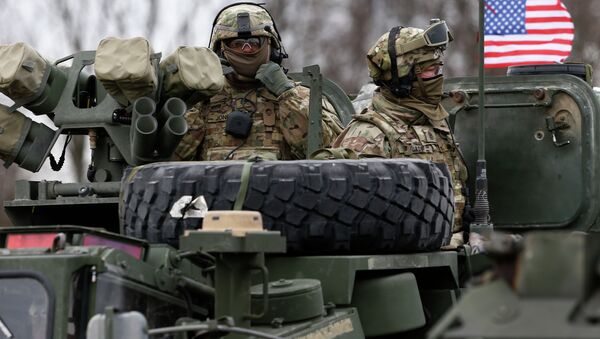The recent statement made by the former supreme commander of NATO retired Gen. Wesley Clark at the Atlantic Council Monday, urging Washington to provide Ukraine with lethal military aid to counter "Russian aggression," is a part of an anti-Russia campaign launched by Washington's "war party," according to Stephen Cohen, a prominent American historian and professor emeritus at Princeton and NYU.
"People who either want or don't recognize the real danger of war with Russia have redoubled their efforts [to aggravate tensions with Moscow]," the expert noted, adding that American tanks rolling across Europe, US military maneuvers in Georgia, a American troops in Ukraine and misinformation about Russia's preparations for military offensive in Ukraine coming out of many Western and NATO capitals, is "an all-out campaign by the people who want a showdown with Russia."
Stephen Cohen underscored that the ultimate goal of the US "war party" is to undermine the Minsk ceasefire agreement, which it sees as a major hindrance to its war plan in Ukraine.
The professor pointed out that the Minsk deal that he qualified as "the last best chance to avert wider war," has borne its fruit and the conflict situation in Ukraine has been gradually deescalating.
The historian noted that the main problem is that the "tiny fragile" peace party in Washington is barely formed.
"Last Monday only 48 members of the House voted against another resolution to send weapons to Kiev," Stephen Cohen stressed, adding that the previous vote had gotten only ten members of the House. It is astonishing that there is no opposition to the war party, the professor noted.
Referring to the anti-Iraqi war campaign of early 2000s, he pointed out that there were many opponents to the war: in the American Congress, in the media, in public opinion. "Where are the opponents today?" the expert asked. It seems that the demonization of Russia's President Putin has ultimately obscured the analytical thinking of Americans, he added.
Stephen Cohen considers the recent statement made by the former supreme commander of NATO retired Gen. Wesley Clark at the Atlantic Council about Russia's forthcoming military offensive in Ukraine (between Orthodox Easter and before V-E Day) a blatant provocation aimed at luring Moscow into an invasion of Ukraine.
At the same time the professor noted that the crumbling Kiev regime is also longing for a war, since a full-scale military campaign might "save" the Ukrainian government from its people's wrath.
"But one piece of wisdom that prevails in Moscow up until now is that Russia should not be permitted to allow itself to be provoked in some kind of actual invasion and large-scale military operation in Ukraine," Stephen Cohen concluded.



